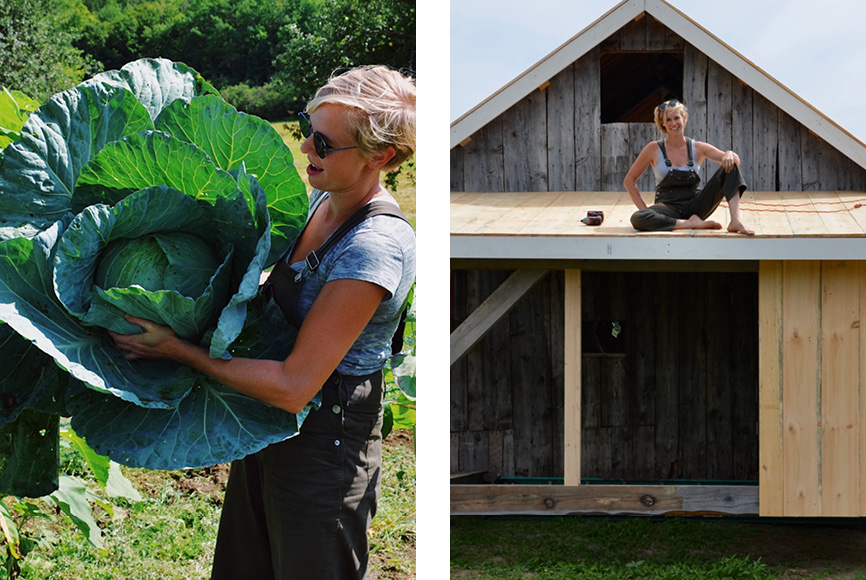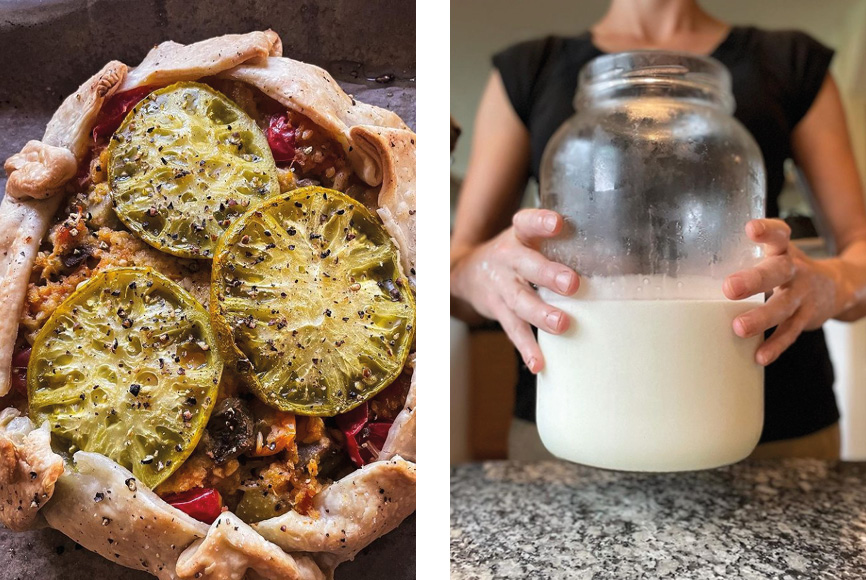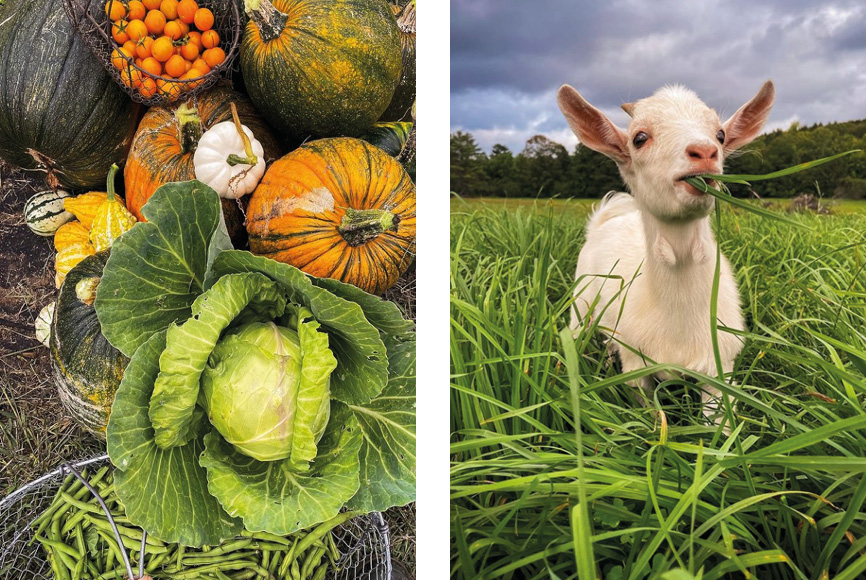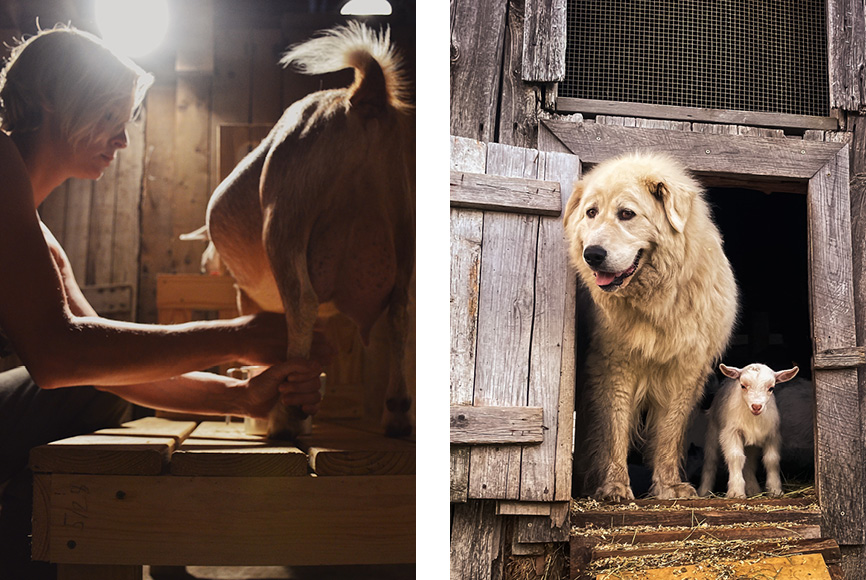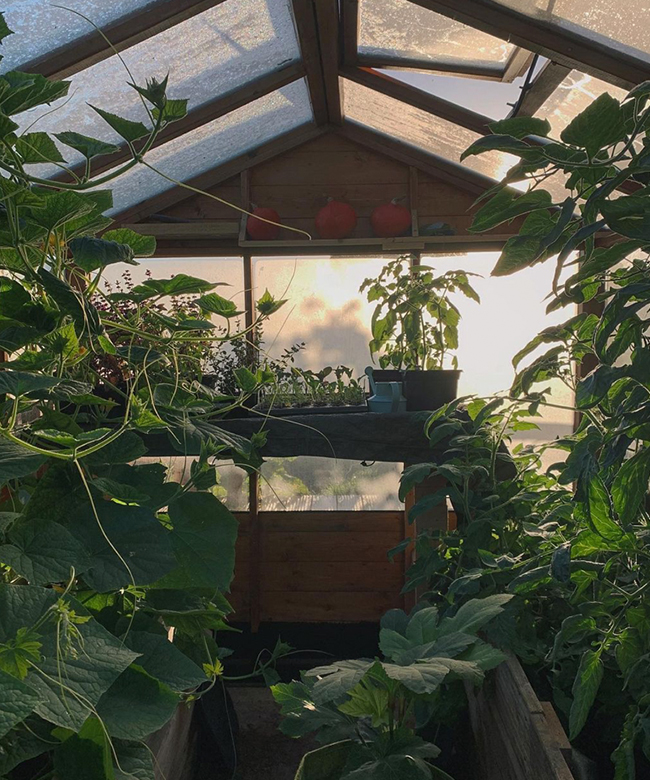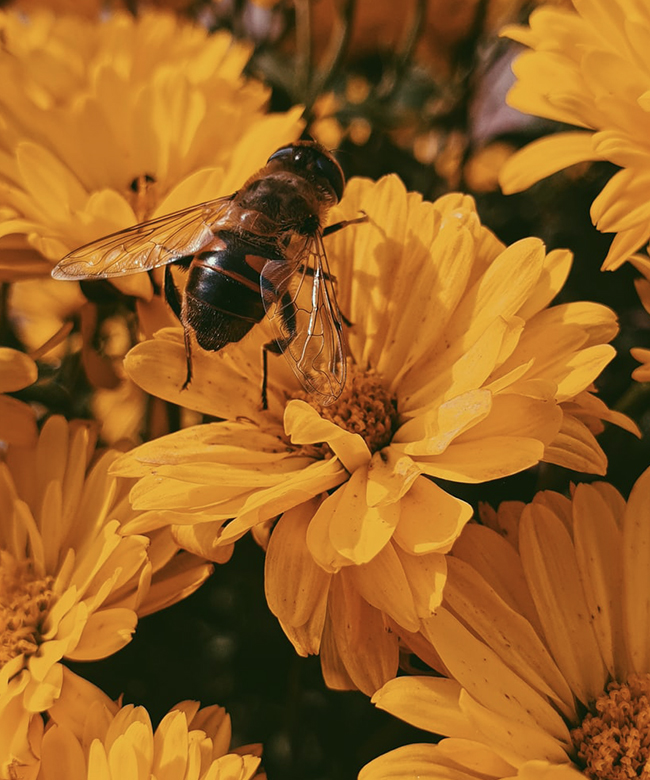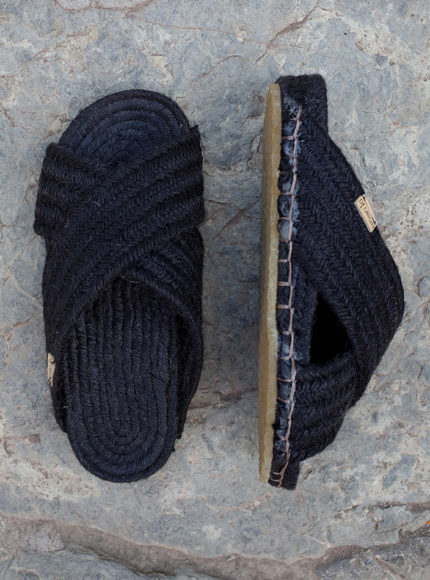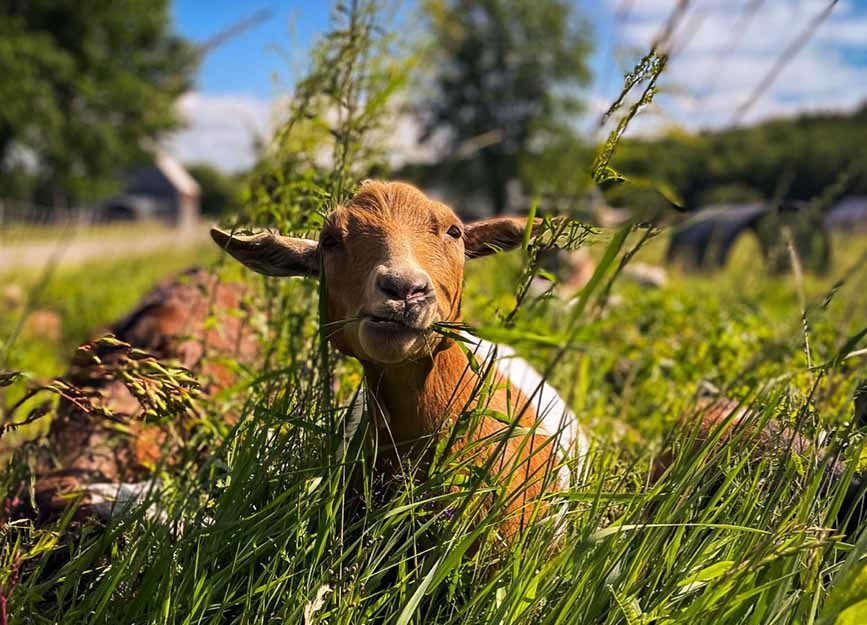

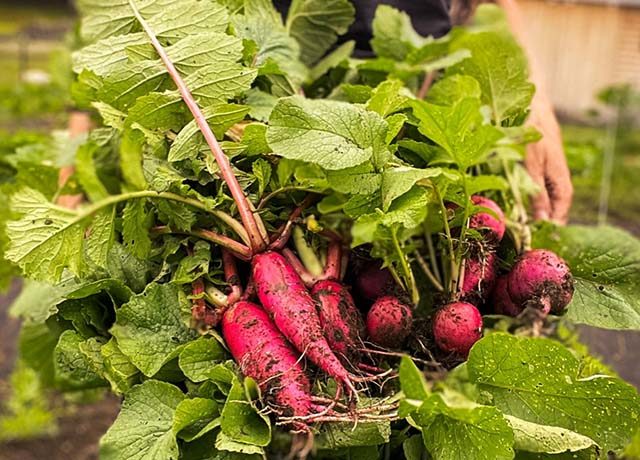

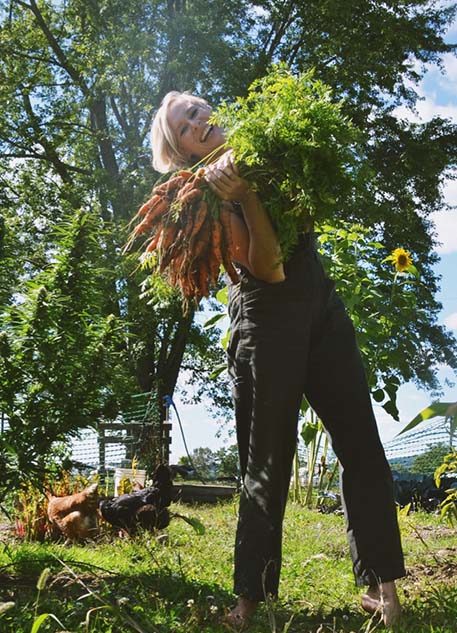

Food & Garden
The Life of A Sustainable Farmer: Hostile Valley Living
Kirsten is a farmer and author restoring a 200 year old Maine farm sustainably. We ask her all about a day in her life and how she is living and farming consciously whilst connecting to nature on a daily basis in her old farmhouse in Maine.
How does your day start? Tell us a bit about your morning routine.
With animals, every morning starts with a very similar routine. The only changes come with the seasons. I get up when the sun does, or before, and immediately get ready to go outside. The goats, sheep, pigs, geese, and ducks all need breakfast and their water refilled. This process takes about a half an hour in total, more if it’s summertime and doe goats need milking or goat kids need special attention. Then I’ll head back to the house and pour myself a cup of coffee and try to give myself at least an hour to catch up on any writing projects, social media, and emails. Finally after that I’ll have a bowl of oatmeal and head out to the garden or barn to officially start the day.
How do you interact with nature when it comes to the food you grow/prepare/eat?
Farming is all about balance with nature, especially on a small scale like we farm. We do our best to work with nature, to accommodate the natural plants and animals. Sometimes it is more of a struggle than others, as with pests in the garden or the prevalence of invasive vines in our woods (introduced here decades ago, and not at all native to Maine). When we must ‘tame’ nature we try to bring things back to how they might have looked had people never arrived in our valley, or give space for native plants and trees to grow where introduced plants currently are. When farming we are always interacting with nature on some level, and our responsibility and hope is to interact in a way that is beneficial to the world around us rather than detrimental.
Best part of your day in terms of food?
This also can differ a great deal depending on the time of year. In the summer it’s lunch because that’s usually just what I find ripened on the vine in the garden — mostly snap peas and carrots, my favorites. But there’s equally as much satisfaction to a lunch or snack in winter, when it’s homemade sourdough bread and pickles that we put away from beans grown in our garden during the summer months. There is nothing quite as satisfying as eating something grown and preserved in summer during the middle of winter.
Favourite season or month for food and why?
August is when things really get good. I love every month that offers fresh produce, but August offers the greatest variety. The plants that take all summer to ripen are finally ready, such as tomatoes and squash, while vegetables that can be succession planted are ready for their second harvest, such as radishes or peas. We can start canning, preserving, and storing some of the larger harvests, like potatoes and beans. The first apples begin to ripen and the fruit, raspberries, blueberries, and blackberries, are still ripe. It is an abundance of deliciousness in the garden, in the woods, and in the fields.
Where do you source your food from?
We try to grow as much as we can for ourselves. What we don’t grow we’ll get at local markets or from local farms, with the exceptions of some bulk cooking items that we order online (such as flour).
If you garden, what is the hardest aspect of gardening and growing your own food that you didn’t foresee? How have you overcome it?
I think many gardeners, myself included, think gardening is much easier than it is. While I grew up with my parents gardening and so had a basic understanding of the effort required, it’s still surprising how gardening takes daily care and work. Not all soil is created equally, and sometimes you need to make major adjustments to the earth. You may battle infestations of various insects or have to fence for deer, plants need regular water and fertilization which may not be available in the soil or from the weather. It’s all a matter of paying attention and responding to the subtle signs your plants are showing you, which is a learned skill that takes practice and simple repeated time among your vegetables.
If you garden, what are your favourite crops you are growing right now? What you would like to grow that you currently don’t?
My favorite crop at the moment is probably beans. String beans in Maine thrive and produce huge numbers of produce with little or no fertilization or soil augmentation, pests don’t bother them, they don’t require a lot of extra watering, and one plant can produce a hearty number of beans. So for effort involved and natural flourishing — beans all the way. I also love snap peas because they are my favorite thing to pluck and eat off the vine as I’m wandering around the garden. Living in such a seasonal area, I always wish we had more time to grow more exotic things, which we may do with a greenhouse someday.
Who and or what is your guiding inspiration when it comes to food?
My parents definitely have a lot to do with my appreciation and understanding of where food comes from, and they made teaching me basic gardening skills a priority which I truly appreciate. I am a huge supporter of local and seasonal eating and chefs who promote that. I find Erin French of The Lost Kitchen here in Freedom, Maine, to be particularly inspiring as a chef and a person. Her story is amazing, and how she has built a brand here in such a remote area is fantastic, as well as her amazing cooking which I’ve had the honor of experiencing a few times. I’d also say that Anthony Bourdain was an inspiration, because I didn’t really think of cooking as anything more than a thing you had to do in order to eat until I started watching his show in my later teens.
What’s an average weekday dinner for you?
We often, especially in the summertime, eat in a hurry. I love a good, big meal that brings family together, but most weekdays it’s just my husband and myself and we’re tired from a long day on the farm. We’re a huge fan of open face sandwiches and meals like the Danish smorrebrod. So most week nights we’ll get some fresh bread toasted and forage the garden and pantry shelves for the best flavor combinations — pickled radishes on toast have been big this year, hard boiled eggs, and fresh cheese.
Favourite vegetable to cook with and why?
I don’t know if I have a favorite vegetable to cook, I so enjoy eating in season. But pumpkins and squash are very fun, and so versatile. Plus they really put you in a seasonal mindset.
As the sunset begins, how do you close your day?
After starting the day at or before dawn, we are very early to bed. Evening chores are basically morning chores in reverse, putting everyone inside, shutting gates and closing up pens and feeding hay and water as the evening meal. During the right season there will be evening milking, and there is always the search for and gathering of eggs. Once everyone is safely inside and fed, we’ll have a quick dinner and settle in with a glass of kombucha and a bar of chocolate (my ‘guilty pleasure’ — no evening goes by without some chocolate!). To be honest, I’m asleep shortly thereafter!
Best advice you have for someone looking to eat more sustainably?
The biggest problems I run into in the homesteading and gardening worlds are people thinking it’s too hard, that it requires a level of skill and that they need to have a huge garden to feed themselves. Start small. Grow a tomato plant. It might not seem like much but it is a start, it might spark a love of growing your own food and it at least will be a few less commercially grown tomatoes that you buy that year. Grow what you love to eat — don’t waste time and effort cultivating instagram trends, grow what you know you’ll enjoy all winter and therefore not waste.
What are your latest efforts towards living a greener life?
I should have mentioned this earlier, but since it’s such a part of our lifestyle I sometimes forget it is unusual — we don’t eat our animals. We started homesteading fully intending to, but as we added animals we realized that we just couldn’t in good conscious. I know many farmers who sustainably raise meat and I applaud their efforts, but for me it’s a moral and ethical choice that I’ve made. At first I thought that it made me somehow less of a farmer, that there was a whole skill set I was missing. But that’s not true at all, I’ve just cultivated a different skill set in growing and preserving my vegetables and providing our animals with the best life possible — and, most importantly, still utilizing them on our farm in a way that celebrates their natural lives and helps us restore our land. We do have to make sure they serve a purpose, because otherwise it wouldn’t be sustainable to keep animals at all. I think we’ve done that very well. We share milk with our goat kids until they are weaned, we mimic the natural rhythms of life in weaning, and we use our chicken and goose eggs. But most of all our animals help with land management: the goats eat overgrowth and brush, the pigs till soil, and the sheep mow the lawn.
In your opinion, what is the most important food item to make sure is organic?
I think more than organic, it’s important to make sure your food is as local as possible and in season when possible. This consciousness has made the biggest difference in my own health and my support of local farmers. Eat in season, eat from farm stands or farmers markets as much as you can. Know your farmer (even if just through social media) and understand their choices in what they grow and how they cultivate it. The more you can understand the process of growing food, the work that goes into a bountiful crop and the treasure that each vegetable is, the greater appreciation you’ll have for the miracle that is a table full of good food.
Follow Hostile Valley on Instagram and find them on their Website!



















